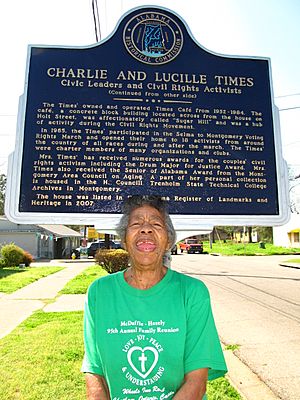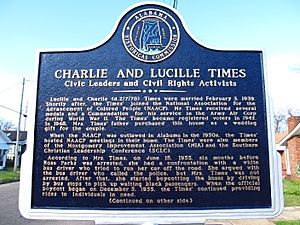Lucille Times facts for kids
Quick facts for kids
Lucille Times
|
|
|---|---|

Lucille with historical marker in front of her house (2012)
|
|
| Born |
Lucille Sharp
April 22, 1921 Hope Hull, Alabama, U.S.
|
| Died | August 16, 2021 (aged 100) Montgomery, Alabama, U.S.
|
| Occupation | Cafe owner/operator |
| Known for | Civil rights activism |
| Spouse(s) |
Charlie Times
(m. 1939; |
Lucille Times (born April 22, 1921 – died August 16, 2021) was an American civil rights activist. This means she worked hard to make sure all people had equal rights and were treated fairly. She was very active in the fight for civil rights in Montgomery, Alabama. This was a time when Montgomery was a very important place for the national movement for equal rights.
Contents
Early Life and Family
Lucille was born on April 22, 1921, in Hope Hull, Alabama. Her mother passed away when Lucille was very young. Her father, William Sharp, raised her in a Christian home with her six brothers and sisters. As a child, her family lived in different cities, including Chicago, Detroit, and various places in Alabama.
Mr. Sharp taught Lucille two very important lessons. First, he taught her that "You are no better than anyone else." Second, he told her, "When you're right don't back down." These ideas helped shape Lucille's strong spirit.
Lucille married Charlie Times on February 3, 1939. Soon after they got married, they both joined the NAACP. The NAACP is a group that works to achieve equal rights for Black people. In 1950, when the NAACP was not allowed to hold meetings in public, Lucille and Charlie bravely hosted meetings in their own home. This was a risky thing to do. In the same year, both Lucille and her husband became registered voters, which meant they could vote in elections.
In 1952, Lucille and Charlie opened their own business, the Times Café. People also called it "Sugarhill." This cafe was on Holt Street and stayed open for many years, until 1986.
Fighting for Change
Early Activism in Detroit
When Lucille Times lived in Detroit, she took part in a successful protest. There was a butcher shop that sold bad meat to a Black customer and refused to give him a refund or new meat. The people in the neighborhood were very upset about this unfair treatment. They decided to stop shopping at that store. Because so many people stopped buying meat there, the shop had to close down in less than a month. This showed Lucille the power of people working together.
The Montgomery Bus Boycott
Lucille Times played a key role in the Montgomery Bus Boycott. In 2017, she shared her story at the Rosa Parks Museum. On June 15, 1955, she was driving her car when a bus driver named James Blake tried to force her car off the road. When she confronted him about his actions, they had a heated disagreement. Soon, two police officers arrived.
When one officer asked what was happening, Lucille explained that the bus driver had used disrespectful language towards her because she was a Black woman. The officer became angry and threatened her.
That night, a civil rights leader named E. D. Nixon came to Lucille's house. Lucille told him what had happened. Nixon said that he could not do anything about what happened off the bus, but that something needed to happen on the bus. Lucille immediately said, "I'm starting a boycott tomorrow!" Nixon suggested waiting until after Thanksgiving, when sales would start, so they could hurt the bus company's profits more. But Lucille strongly repeated, "I'm starting a boycott tomorrow!"
The very next day, Lucille began her own personal boycott. She used her car to drive people in her neighborhood to their jobs and other places. She would also pick up people who were waiting at bus stops. Her husband, Charlie, helped by driving his car too. They even had a "donations" jar at their cafe where people could give money for gasoline. The cafe became a central place where people could call if they needed a ride.
During this time, E. D. Nixon brought another important civil rights leader, A. Philip Randolph, to Lucille's house twice. Lucille told him her story. Meanwhile, Charlie Times began meeting secretly with Nixon at the cafe. They were planning for a much larger, organized boycott. Charlie even kept these plans a secret from Lucille until the big boycott officially started in December. Lucille continued driving people as she had been, helping the community, until the large boycott ended in December 1956.
Later Life and Death
Lucille Times passed away on August 16, 2021, from COVID-19. Her funeral was held at St Jude Catholic Church in Montgomery.
 | William M. Jackson |
 | Juan E. Gilbert |
 | Neil deGrasse Tyson |


